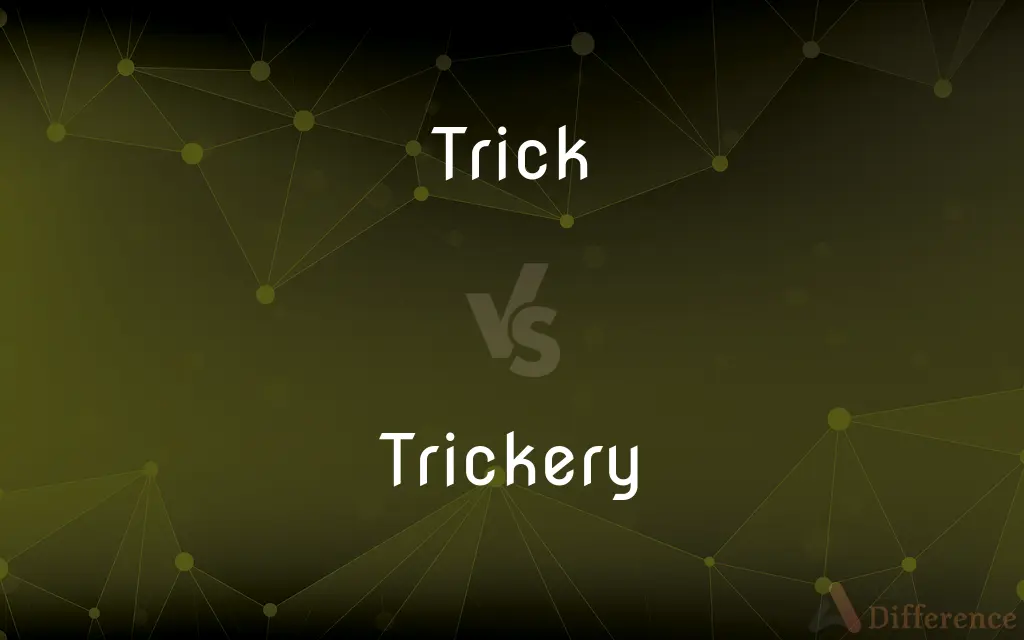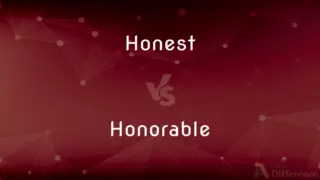Trick vs. Trickery — What's the Difference?
By Fiza Rafique & Urooj Arif — Updated on April 3, 2024
Trick involves a cunning or clever act meant to deceive or surprise, while trickery refers to the practice or art of employing tricks to deceive.

Difference Between Trick and Trickery
Table of Contents
ADVERTISEMENT
Key Differences
A trick is an individual act or maneuver designed to deceive, amuse, or outsmart someone, often with the intention of achieving a specific outcome. It can be as harmless as a magic trick or as harmful as a scam. Trickery, on the other hand, encompasses the broader concept of using tricks systematically or habitually. It implies a disposition towards deception and manipulation, often with negative connotations, suggesting deceitful strategy or tactics rather than a single act.
Tricks are often seen in various contexts, from playful and entertaining settings, like magic shows, to more serious and sometimes unethical scenarios, like tricking someone into giving away personal information. Trickery, however, is typically used in contexts that emphasize the deceitful nature of actions over time, suggesting premeditation and a pattern of deceptive behavior rather than isolated incidents.
While a trick might involve a quick and clever technique or ploy, trickery suggests an ongoing effort or scheme involving multiple tricks or deceptive practices. Trickery can be associated with a more calculated, sustained effort to deceive or manipulate, often for personal gain or to achieve a particular end through dishonest means.
In literature and speech, a trick can be admired for its cleverness or ingenuity, especially if it's harmless and entertaining. Trickery, however, is almost always used pejoratively, indicating disapproval of the deceitful methods employed. It's the difference between acknowledging a single act of deception and condemning a habitual reliance on such tactics.
Understanding the distinction between trick and trickery is essential in assessing the ethical implications of deception. A trick can be a one-time action, potentially benign or malicious, while trickery implies a systematic approach to deception, highlighting a character trait or methodological preference for achieving goals through dishonest means.
ADVERTISEMENT
Comparison Chart
Definition
A cunning or clever act designed to deceive or amuse.
The practice or art of using tricks to deceive.
Context
Can be playful or serious, isolated incidents.
Typically involves systematic or habitual deception.
Connotation
Neutral to negative, depending on intent and outcome.
Predominantly negative, emphasizing deceit.
Focus
On the individual act or technique.
On the method or strategy involving multiple tricks.
Ethical Implications
Variable, can be harmless or unethical.
Generally viewed as unethical due to deceitful nature.
Compare with Definitions
Trick
A clever action or strategy designed to deceive.
The magician's trick left the audience in awe.
Trickery
The employment of tricks to deceive others.
The novel's villain used trickery to gain the throne.
Trick
May refer to a technique or method.
Knowing the trick to a perfect pie crust is essential for bakers.
Trickery
Suggests a habitual or systematic approach.
The politician's career was marred by allegations of trickery.
Trick
Can be used for entertainment or deceit.
She played a harmless trick on her friend for April Fool's Day.
Trickery
Often carries a negative connotation.
Victims of the scam were outraged by the trickery involved.
Trick
Can be admired if harmless.
The children giggled at the clever trick performed by the clown.
Trickery
Associated with deceit and manipulation.
He resorted to trickery to win the competition, which cost him his reputation.
Trick
Often involves ingenuity or surprise.
The trick to solving the puzzle was simpler than we thought.
Trickery
Viewed as unethical.
The court case revealed the extent of the company's financial trickery.
Trick
A cunning act or scheme intended to deceive or outwit someone
He's a double-dealer capable of any mean trick
Trickery
The practice or use of tricks; deception by stratagem.
Trick
A peculiar or characteristic habit or mannerism
She had a trick of clipping off certain words and phrases
Trickery
(uncountable) Deception or underhanded behavior.
Trick
(in bridge, whist, and similar card games) a sequence of cards forming a single round of play. One card is laid down by each player, the highest card being the winner.
Trickery
(uncountable) The art of dressing up; imposture.
Trick
A prostitute's client.
Trickery
(uncountable) Artifice; the use of one or more stratagems.
Trick
A sailor's turn at the helm, usually lasting for two or four hours.
Trickery
(countable) An instance of deception, underhanded behavior, dressing up, imposture, artifice, etc.
Trick
Cunningly deceive or outwit
Many people have been tricked by villains with false identity cards
Trickery
The art of dressing up; artifice; stratagem; fraud; imposture.
Trick
Sketch (a coat of arms) in outline, with the colours indicated by letters or signs.
Trickery
Verbal misrepresentation intended to take advantage of you in some way
Trick
Intended or used to deceive or mystify, or to create an illusion
A trick question
Trickery
The use of tricks to deceive someone (usually to extract money from them)
Trick
Liable to fail; defective
A trick knee
Trick
An act or procedure intended to achieve an end by deceptive or fraudulent means.
Trick
A mischievous action; a prank
Likes to play tricks on the other students in the dorm.
Trick
A stupid, disgraceful, or childish act
Don't let the kids pull any tricks while we're gone.
Trick
A peculiar trait or characteristic; a mannerism
“Mimicry is the trick by which a moth or other defenseless insect comes to look like a wasp” (Marston Bates).
Trick
A peculiar event with unexpected, often deceptive results
“One of history's cruelest tricks is to take words that sounded good at the time and make them sound pretty stupid” (David Owen).
Trick
A deceptive or illusive appearance; an illusion
This painting plays tricks on the eyes.
Trick
A special skill; a knack
Is there a trick to getting this window to stay up?.
Trick
A convention or specialized skill peculiar to a particular field of activity
Learned the tricks of the winemaking trade.
Trick
A feat of magic or legerdemain.
Trick
A difficult, dexterous, or clever act designed to amuse
Does your dog do any tricks?.
Trick
All the cards played in a single round, one from each player.
Trick
One such round.
Trick
A period or turn of duty, as at the helm of a ship.
Trick
(Slang) A prison term.
Trick
An act of prostitution.
Trick
A prostitute's customer.
Trick
A session carried out by a prostitute with a client.
Trick
(Slang) A robbery or theft.
Trick
To cheat or deceive or to practice trickery or deception.
Trick
Of, relating to, or involving tricks.
Trick
Capable of performing tricks
A trick dog.
Trick
Designed or made for doing a trick or tricks
Trick cards.
Trick dice.
Trick
Weak, defective, or liable to fail
A trick knee.
Trick
Something designed to fool or swindle.
It was just a trick to say that the house was underpriced.
Trick
A single element of a magician's (or any variety entertainer's) act; a magic trick.
And for my next trick, I will pull a wombat out of a duffel bag.
Trick
An entertaining difficult physical action.
That's a nice skateboard, but can you do any tricks on it?
Trick
An effective, clever or quick way of doing something.
Tricks of the trade;
What's the trick of getting this chair to fold up?
Trick
Mischievous or annoying behavior; a prank.
The tricks of boys
They played a crude trick on the teacher.
Trick
(dated) A particular habit or manner; a peculiarity; a trait.
A trick of drumming with the fingers; a trick of frowning
Trick
A knot, braid, or plait of hair.
Trick
(card games) A sequence in which each player plays a card and a winning play is determined.
I was able to take the second trick with the queen of hearts.
Trick
(slang) A customer or client of a prostitute.
As the businessman rounded the corner, she thought, "Here comes another trick."
Trick
A term of abuse.
Trick
A daily period of work, especially in shift-based jobs.
Trick
(nautical) A sailor's spell of work at the helm, usually two hours long.
Trick
A toy; a trifle; a plaything.
Trick
(transitive) To fool; to cause to believe something untrue; to deceive.
You tried to trick me when you said that house was underpriced.
Trick
(heraldry) To draw (as opposed to blazon - to describe in words).
Trick
To dress; to decorate; to adorn fantastically; often followed by up, off, or out.
Trick
Involving trickery or deception.
Trick photography
Trick
Able to perform tricks.
A trick pony
Trick
Defective or unreliable.
A trick knee
Trick
Stylish or cool.
Wow, your new sportscar is so trick.
Trick
An artifice or stratagem; a cunning contrivance; a sly procedure, usually with a dishonest intent; as, a trick in trade.
He comes to me for counsel, and I show him a trick.
I know a trick worth two of that.
Trick
A sly, dexterous, or ingenious procedure fitted to puzzle or amuse; as, a bear's tricks; a juggler's tricks.
Trick
Mischievous or annoying behavior; a prank; as, the tricks of boys.
Trick
A particular habit or manner; a peculiarity; a trait; as, a trick of drumming with the fingers; a trick of frowning.
The trick of that voice I do well remember.
He hath a trick of CŒur de Lion's face.
Trick
A knot, braid, or plait of hair.
Trick
The whole number of cards played in one round, and consisting of as many cards as there are players.
On one nice trick depends the general fate.
Trick
A turn; specifically, the spell of a sailor at the helm, - usually two hours.
Trick
A toy; a trifle; a plaything.
Trick
To deceive by cunning or artifice; to impose on; to defraud; to cheat; as, to trick another in the sale of a horse.
Trick
To dress; to decorate; to set off; to adorn fantastically; - often followed by up, off, or out.
People lavish it profusely in tricking up their children in fine clothes, and yet starve their minds.
They are simple, but majestic, records of the feelings of the poet; as little tricked out for the public eye as his diary would have been.
Trick
To draw in outline, as with a pen; to delineate or distinguish without color, as arms, etc., in heraldry.
They forget that they are in the statutes: . . . there they are tricked, they and their pedigrees.
Trick
A cunning or deceitful action or device;
He played a trick on me
He pulled a fast one and got away with it
Trick
A period of work or duty
Trick
An attempt to get you to do something foolish or imprudent;
That offer was a dirty trick
Trick
A ludicrous or grotesque act done for fun and amusement
Trick
An illusory feat; considered magical by naive observers
Trick
Deceive somebody;
We tricked the teacher into thinking that class would be cancelled next week
Common Curiosities
What is the main difference between a trick and trickery?
The main difference lies in scope and ethical implication: a trick is a singular act, which can be benign or malicious, whereas trickery refers to the practice of employing tricks deceitfully on a habitual basis.
Can trickery ever be justified?
While trickery is generally viewed negatively due to its association with deceit, some might argue that in certain contexts (e.g., espionage, strategic games) it could be considered justified, though this is ethically debatable.
How can one differentiate between harmless tricks and unethical trickery?
The differentiation often depends on the intent behind the action and its consequences. Harmless tricks aim to entertain or mildly surprise without causing harm or distress, whereas unethical trickery involves deception for personal gain, manipulation, or harm.
Can tricks be a part of professional practices?
Yes, tricks can be part of professional practices in fields such as magic and illusion, negotiation tactics, marketing strategies, and even in sports, where skillful maneuvers are often referred to as tricks.
How do tricks relate to magic?
In magic, tricks are the fundamental elements of the performance, designed to entertain by deceiving the audience into believing in the impossible, typically seen as a form of art rather than deceit.
What are examples of trickery in history?
Trickery has been used in various historical contexts, such as military strategies like the Trojan Horse in ancient Greece, political manipulations, or in the form of financial scams and frauds throughout history.
Is trickery always planned?
Trickery often implies a level of premeditation and planning, as it involves the systematic use of deceptive methods rather than spontaneous actions.
Is a trick always intended to deceive?
While deception is often a component, tricks can also be used for entertainment, education, or demonstration purposes, where the intent is not to deceive but to amuse or inform.
Can trickery be found in nature?
Yes, trickery is observed in nature, such as in mimicry and camouflage used by animals and insects to deceive predators or prey, although this is a survival mechanism rather than ethical deceit.
How does society view trickery in competition?
Society's view on trickery in competition varies; it is often condemned in contexts where fairness and honesty are valued, but in some competitive strategies, cunning maneuvers are seen as clever and acceptable.
Can technology be used for trickery?
Yes, technology can be used for trickery, such as in phishing scams, identity theft, deepfake videos, and other forms of cyber deception that manipulate information or appearances.
Is there a cultural difference in the perception of tricks and trickery?
Cultural perceptions of tricks and trickery can vary significantly, with some cultures valuing cleverness and strategic deception more than others, which may prioritize honesty and straightforwardness.
How do legal systems deal with trickery?
Legal systems typically address trickery through laws against fraud, deceit, and misrepresentation, with penalties varying based on the severity and impact of the deceptive acts.
Are children's pranks considered trickery?
Children's pranks are generally considered tricks rather than trickery, as they are usually intended for amusement rather than harm. However, the perception can vary based on the nature and outcome of the prank.
How can individuals protect themselves against trickery?
Protecting against trickery involves staying informed about common deceptive practices, critically assessing information, being cautious in potentially manipulative situations, and sometimes seeking advice from trusted sources.
Share Your Discovery

Previous Comparison
Anorexia vs. Bulimia
Next Comparison
Honest vs. HonorableAuthor Spotlight
Written by
Fiza RafiqueFiza Rafique is a skilled content writer at AskDifference.com, where she meticulously refines and enhances written pieces. Drawing from her vast editorial expertise, Fiza ensures clarity, accuracy, and precision in every article. Passionate about language, she continually seeks to elevate the quality of content for readers worldwide.
Co-written by
Urooj ArifUrooj is a skilled content writer at Ask Difference, known for her exceptional ability to simplify complex topics into engaging and informative content. With a passion for research and a flair for clear, concise writing, she consistently delivers articles that resonate with our diverse audience.
















































